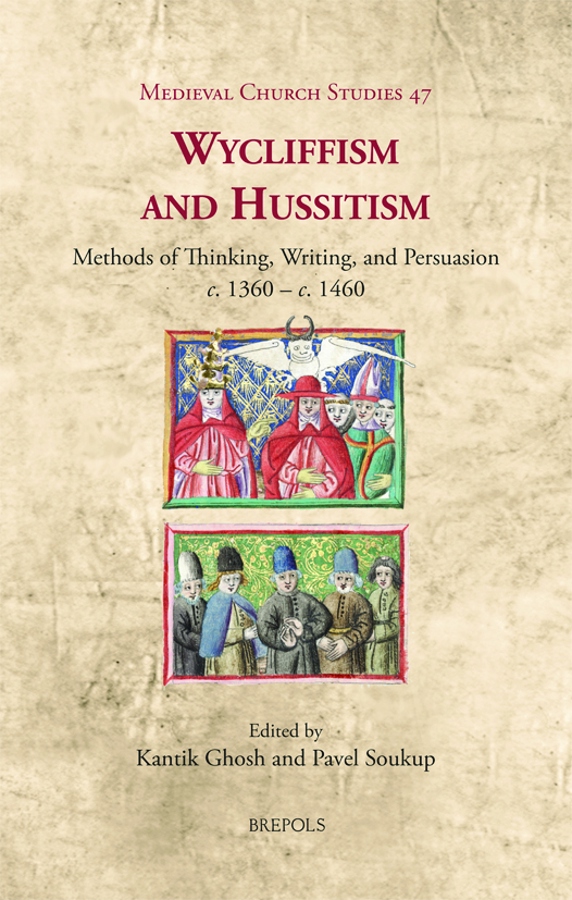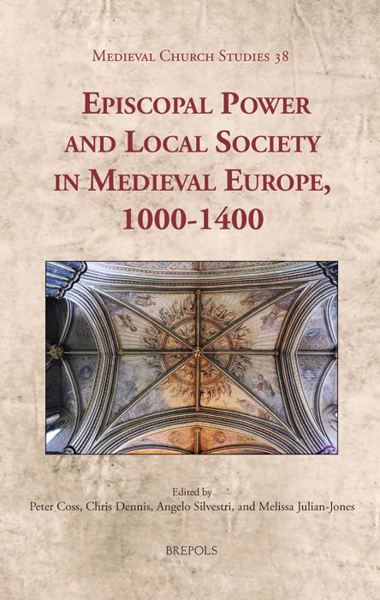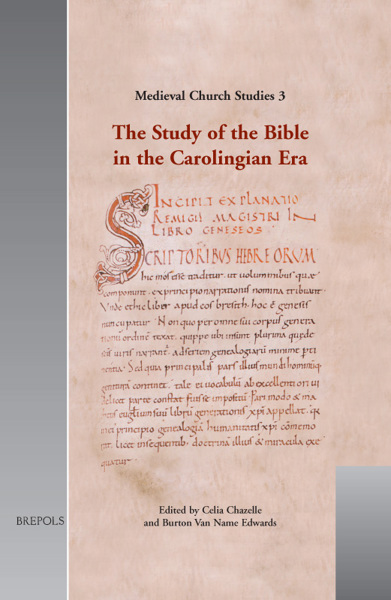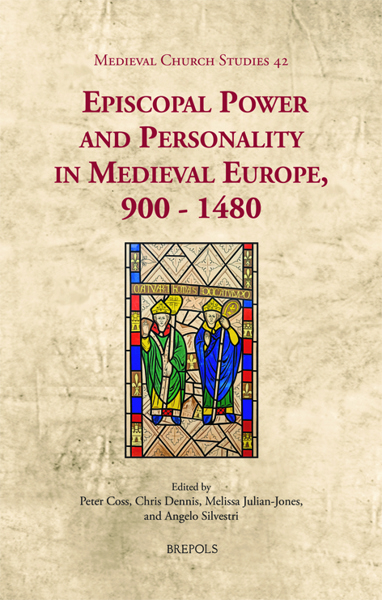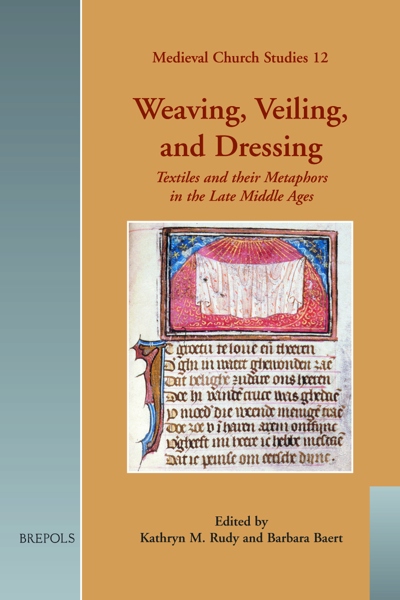
Wycliffism and Hussitism
Methods of Thinking, Writing, and Persuasion, c. 1360 – c. 1460
Kantik Ghosh, Pavel Soukup (eds)
- Pages: 443 p.
- Size:156 x 234 mm
- Language(s):English
- Publication Year:2021
- € 115,00 EXCL. VAT RETAIL PRICE
- ISBN: 978-2-503-58382-2
- Hardback
- Available
- € 115,00 EXCL. VAT RETAIL PRICE
- ISBN: 978-2-503-58383-9
- E-book
- Available
A groundbreaking interdisciplinary volume bringing together the latest in Wycliffite and Hussite scholarship on methods, impact, and responses.
- Reformation & Counterreformation Theologies (c. 1300-1648)
- Religious Philosophy
- Renaissance (humanist) Philosophy (c. 1300-1650)
- Judaeo-Christian Bible and other sacred texts
- Heresies, persecutions of heterodoxy & sects
- Translation & vernacularity
- Cultural & intellectual history (c. 500-1500)
- Religious history (c. 500-1500)
“These essays are invaluable in expanding our understanding of the place of science in the Middle Ages.” (Judith Collard, in Parergon, 39/2, 2022, p. 158)
“The quality of the essays in this collection is consistently high, and the editors are to be commended for their work in unifying the various interrelated strands of argument under the overarching themes of thinking, writing, and persuading. Taken together, these contributions paint a more nuanced and complex portrait of the conflicts and controversies of late medieval European Christianity, one that is attentive to the context of these debates as represented in the sources and which resists oversimplification. It is only to be hoped that such fruitful dialogue between international scholars will continue to bear such welcome fruit.” (Sean Otto, in The Medieval Review, 14/08/2023)
« (…) ce livre aussi profus que profond rendra d’immenses services non seulement aux spécialistes patentés de l’hérésiologie médiévale, mais aussi à tous ceux qui s’intéressent à l’histoire religieuse et intellectuelle du XVe siècle. » (OLIVIER MARIN, dans la Revue de l’histoire des religions, 240/3, 2023)
“Die Hussitologie ist heute breiter aufgestellt, thema[1]tisch vielfältiger und zugleich besser kontextualisiert. Der vorliegende Sammelband legt davon eindrucksvoll Zeugnis ab – hinterfragt jedoch nicht allein den weitgehend bekannten Ideentransfer, sondern rückt vielmehr die genaue Rezeption seiner Kon[1]zepte im zeitgenössischen Diskurs in den Vordergrund.” (Thomas Krzenck, in Bohemia, 61/2, 2021, p. 267)
“This collection is set fair to become the go-to book for anyone interested in its specific subject, and, more generally, in the transnational and translingual transmission of ‘heresy’ across medieval Europe. Quite simply, there is nothing like it. The scholarship is of a consistently high standard, thoroughgoing and well-informed. All those involved are to be congratulated on a formidable intellectual achievement. Here is an object-lesson in what genuinely cooperative international scholarship can create.” (Alastair Minnis, in Medium Ævum, XCII/I, 2023, p. 215)
Kantik Ghosh is Associate Professor of English at Oxford University and a fellow of Trinity College.
Pavel Soukup is Researcher at the Centre for Medieval Studies, Institute of Philosophy, Czech Academy of Sciences, Prague.
John Wyclif (d. 1384), famous Oxford philosopher-theologian and controversialist, was posthumously condemned as a heretic at the Council of Constance in 1415. Wyclif’s influence was pan-European and had a particular impact on Prague, where Jan Hus, from Charles University, was his avowed disciple and the leader of a dissident reformist movement. Hus, condemned to the stake at Constance, gathered around him a prolific circle of disciples who changed the landscape of late medieval religion and literature in Bohemia, just as Wyclif’s own followers had done in England.
Both thinkers, and the movements associated with them, played a crucial role in the transformation of later medieval European thought, in particular through a radically enlarged role of textual production in the vernaculars (especially Middle English and Old Czech), as well as in Latin, in the philosophical, theological, and ecclesiological realms.
This interdisciplinary volume of essays brings together cutting-edge research from scholars working in these and contiguous fields and asks fundamental questions about the methods that informed Wycliffite and Hussite writings and those by their interlocutors and opponents. Viewing these debates through a methodological lens enables a reassessment of the impact that they had, and the responses they elicited, across a range of European cultures, from England in the west via France and Austria to Bohemia in the east.
Introduction
Philosophy, Politics, and perplexitas: A Socio-Epistemic Approach to Late Medieval Religion — KANTIK GHOSH AND PAVEL SOUKUP
Setting the Scene: Ideas, Institutions, and Public Scandal: Academic Debates in Late Medieval Scholasticism — MAARTEN J. F. M. HOENEN
Part I: Methods of Thinking: Philosophical and Theological Speculation
John Wyclif on Implicit Faith — CHRISTOPHE GRELLARD
A Question of Style: The Place of Rhetoric in Jean Gerson’s Understanding of Theological Language and Method — ISABEL IRIBARREN
Puri philosophi non est theologizare: Reflections on Method in John Wyclif’s and his Bohemian Followers’ Discussions of the Eternity of the World — LUIGI CAMPI
New Texts Relevant to the Reception of John Wyclif in Late Medieval Bohemia — MARTIN DEKARLI
From Oath to Confession and Back?: Protestatio in the Late Middle Ages, and its Transformation in the Thought of Wyclif and the Hussites — DUŠAN COUFAL
Part II: Methods of Writing: Compilation Practice and the Material Text
Trewe and Pretended: The Middle English Rosarium on Law —FIONA SOMERSET
‘Openliere and shortliere’: Methods of Exegesis and Abbreviation in a Wycliffite ‘Summary’ of the Bible — HANNAH SCHÜHLE-LEWIS
Wyclif and Hus at the Council of Constance — PETRA MUTLOVÁ
Stanislav of Znojmo and the Arrival of Wyclif’s Remanence Theory at the University of Vienna — MONICA BRÎNZEI
Non-biblical Texts in Old Czech Bibles — KATEŘINA VOLEKOVÁ
Thomas Gascoigne’s Research on Central Europe c. 1456 — MICHAEL VAN DUSSEN
Part III: Methods of Persuasion: Politics and the Transmission of Ideas
The Mediation of God’s Word in Hussite Apocalyptic Exegesis and the Influence of Joachimism — PAVLÍNA CERMANOVÁ
Scriptural Exegesis and Clerical Discourse in Hussite Preaching — PAVEL SOUKUP
Fighting for the Minds of the People: Strategies of Argumentation in the Vernacular Discourse on Church Unity in Fifteenth-Century Bohemia — PAVLÍNA RYCHTEROVÁ
Patchwork Campaigning Against Hussitism: The University of Vienna and its Tractatus contra articulos Hussitarum from 1424 — CHRISTINA TRAXLER
Theological Diplomacy? Cusanus and the Hussites — THOMAS WOELKI
***
Index nominum
General Index

